Mental Illness in Nursing Profession
VerifiedAdded on 2023/03/31
|7
|1359
|484
AI Summary
This research focuses on the impact of mental illness on the nursing profession and patient health. It discusses the factors contributing to mental illness in nursing, such as patient demands and working in a team. The research also explores the attitudes towards nurses with mental illness and the role of education and knowledge in developing a positive attitude. The findings suggest that positive attitudes can be developed through workplace factors and personal contact with individuals with mental illness.
Contribute Materials
Your contribution can guide someone’s learning journey. Share your
documents today.
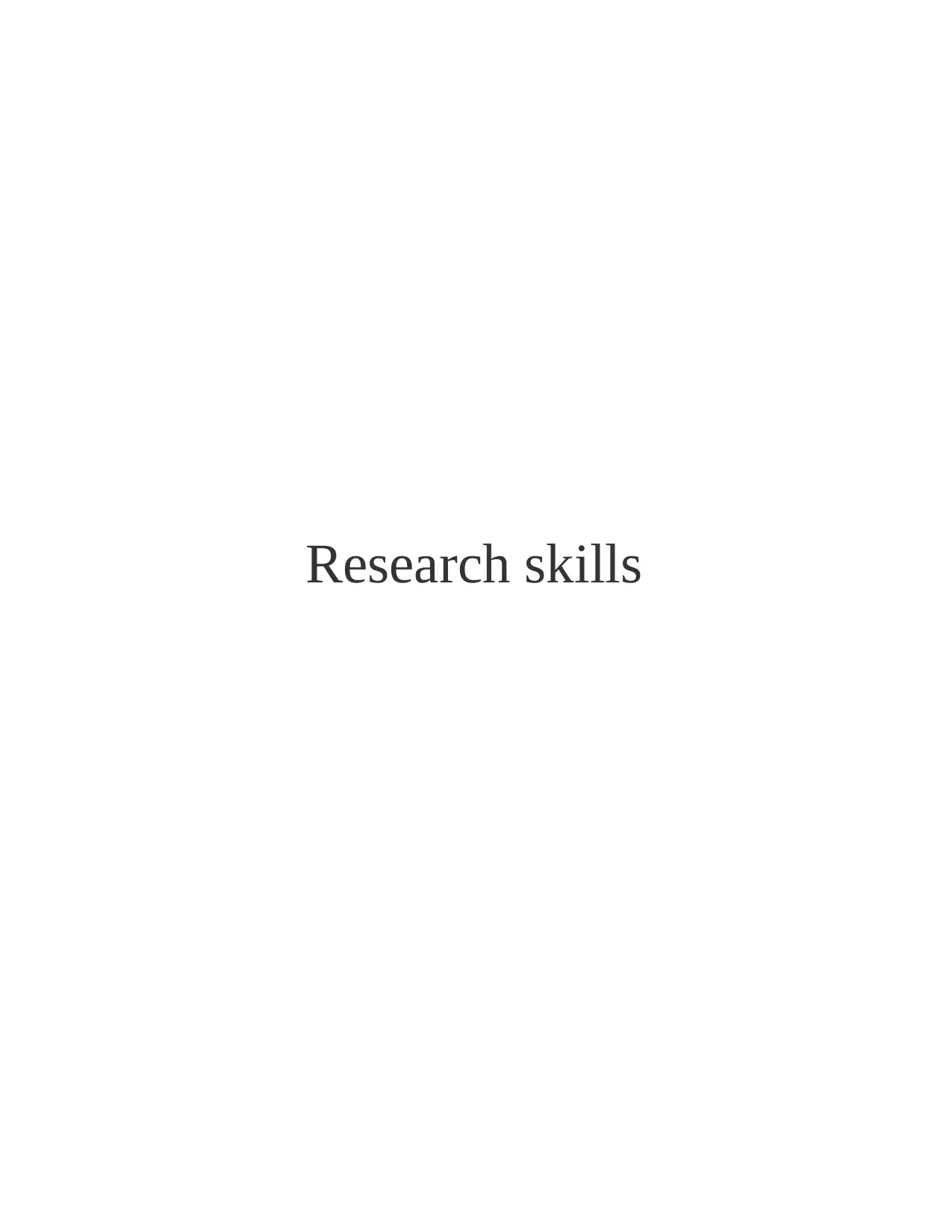
Research skills
Secure Best Marks with AI Grader
Need help grading? Try our AI Grader for instant feedback on your assignments.
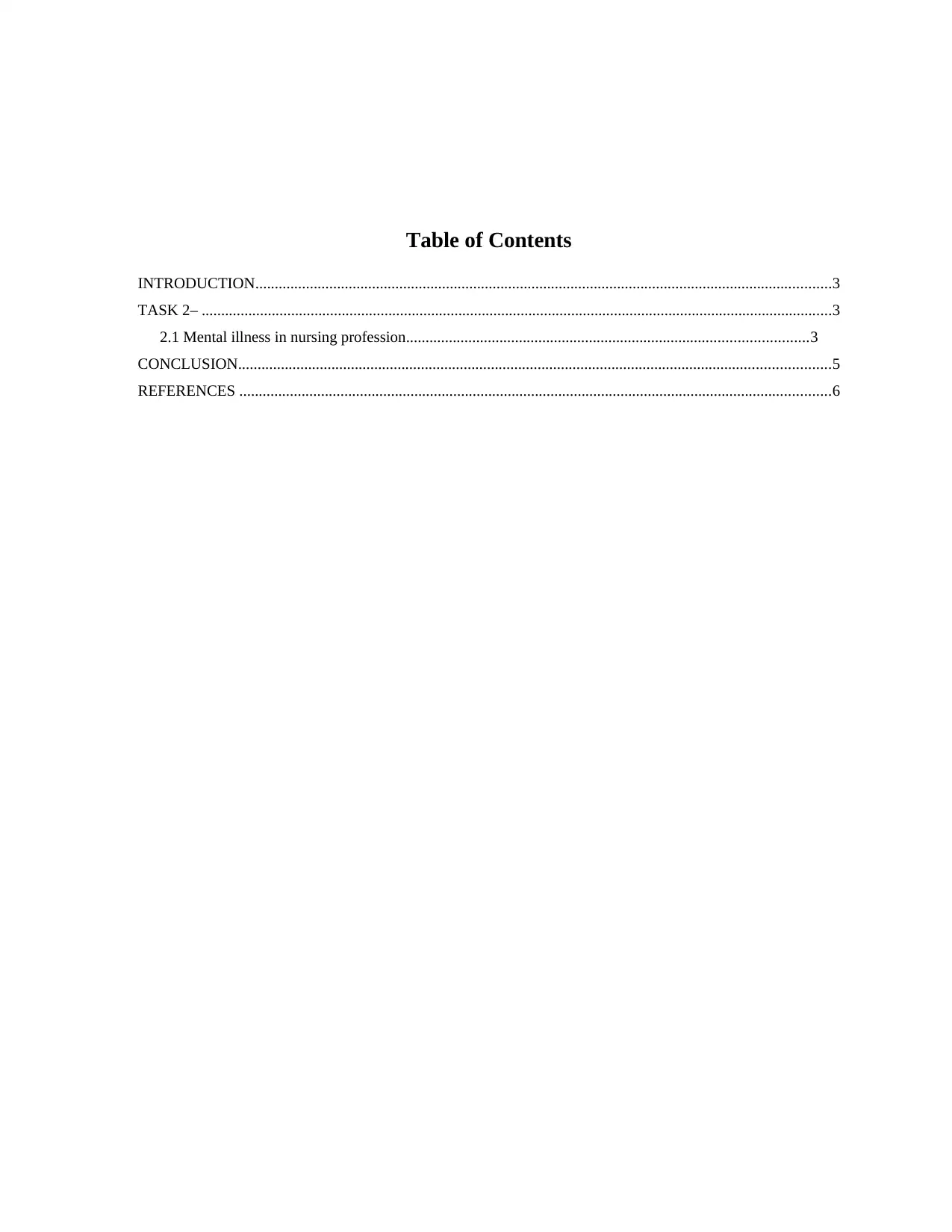
Table of Contents
INTRODUCTION....................................................................................................................................................3
TASK 2– ..................................................................................................................................................................3
2.1 Mental illness in nursing profession.......................................................................................................3
CONCLUSION........................................................................................................................................................5
REFERENCES ........................................................................................................................................................6
INTRODUCTION....................................................................................................................................................3
TASK 2– ..................................................................................................................................................................3
2.1 Mental illness in nursing profession.......................................................................................................3
CONCLUSION........................................................................................................................................................5
REFERENCES ........................................................................................................................................................6
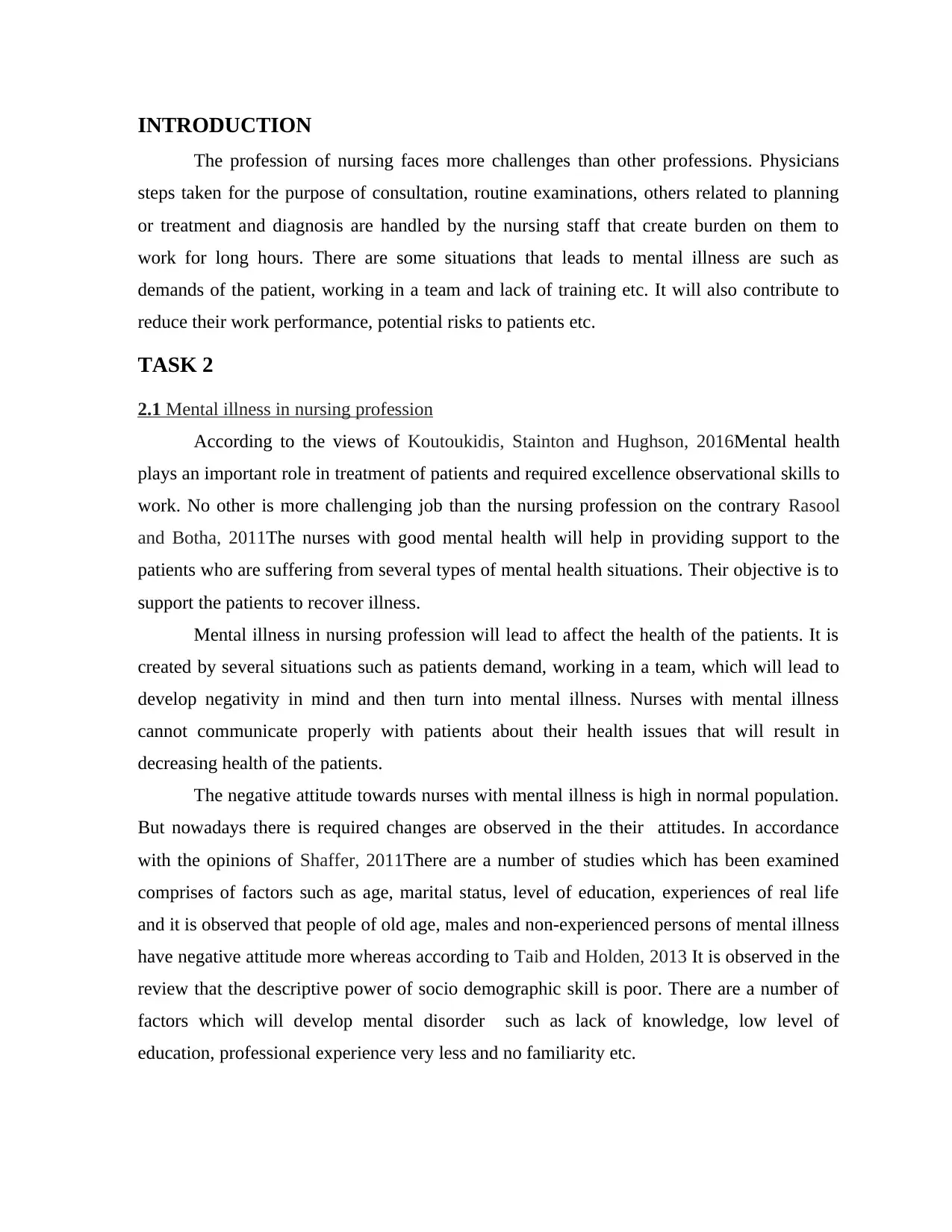
INTRODUCTION
The profession of nursing faces more challenges than other professions. Physicians
steps taken for the purpose of consultation, routine examinations, others related to planning
or treatment and diagnosis are handled by the nursing staff that create burden on them to
work for long hours. There are some situations that leads to mental illness are such as
demands of the patient, working in a team and lack of training etc. It will also contribute to
reduce their work performance, potential risks to patients etc.
TASK 2
2.1 Mental illness in nursing profession
According to the views of Koutoukidis, Stainton and Hughson, 2016Mental health
plays an important role in treatment of patients and required excellence observational skills to
work. No other is more challenging job than the nursing profession on the contrary Rasool
and Botha, 2011The nurses with good mental health will help in providing support to the
patients who are suffering from several types of mental health situations. Their objective is to
support the patients to recover illness.
Mental illness in nursing profession will lead to affect the health of the patients. It is
created by several situations such as patients demand, working in a team, which will lead to
develop negativity in mind and then turn into mental illness. Nurses with mental illness
cannot communicate properly with patients about their health issues that will result in
decreasing health of the patients.
The negative attitude towards nurses with mental illness is high in normal population.
But nowadays there is required changes are observed in the their attitudes. In accordance
with the opinions of Shaffer, 2011There are a number of studies which has been examined
comprises of factors such as age, marital status, level of education, experiences of real life
and it is observed that people of old age, males and non-experienced persons of mental illness
have negative attitude more whereas according to Taib and Holden, 2013 It is observed in the
review that the descriptive power of socio demographic skill is poor. There are a number of
factors which will develop mental disorder such as lack of knowledge, low level of
education, professional experience very less and no familiarity etc.
The profession of nursing faces more challenges than other professions. Physicians
steps taken for the purpose of consultation, routine examinations, others related to planning
or treatment and diagnosis are handled by the nursing staff that create burden on them to
work for long hours. There are some situations that leads to mental illness are such as
demands of the patient, working in a team and lack of training etc. It will also contribute to
reduce their work performance, potential risks to patients etc.
TASK 2
2.1 Mental illness in nursing profession
According to the views of Koutoukidis, Stainton and Hughson, 2016Mental health
plays an important role in treatment of patients and required excellence observational skills to
work. No other is more challenging job than the nursing profession on the contrary Rasool
and Botha, 2011The nurses with good mental health will help in providing support to the
patients who are suffering from several types of mental health situations. Their objective is to
support the patients to recover illness.
Mental illness in nursing profession will lead to affect the health of the patients. It is
created by several situations such as patients demand, working in a team, which will lead to
develop negativity in mind and then turn into mental illness. Nurses with mental illness
cannot communicate properly with patients about their health issues that will result in
decreasing health of the patients.
The negative attitude towards nurses with mental illness is high in normal population.
But nowadays there is required changes are observed in the their attitudes. In accordance
with the opinions of Shaffer, 2011There are a number of studies which has been examined
comprises of factors such as age, marital status, level of education, experiences of real life
and it is observed that people of old age, males and non-experienced persons of mental illness
have negative attitude more whereas according to Taib and Holden, 2013 It is observed in the
review that the descriptive power of socio demographic skill is poor. There are a number of
factors which will develop mental disorder such as lack of knowledge, low level of
education, professional experience very less and no familiarity etc.
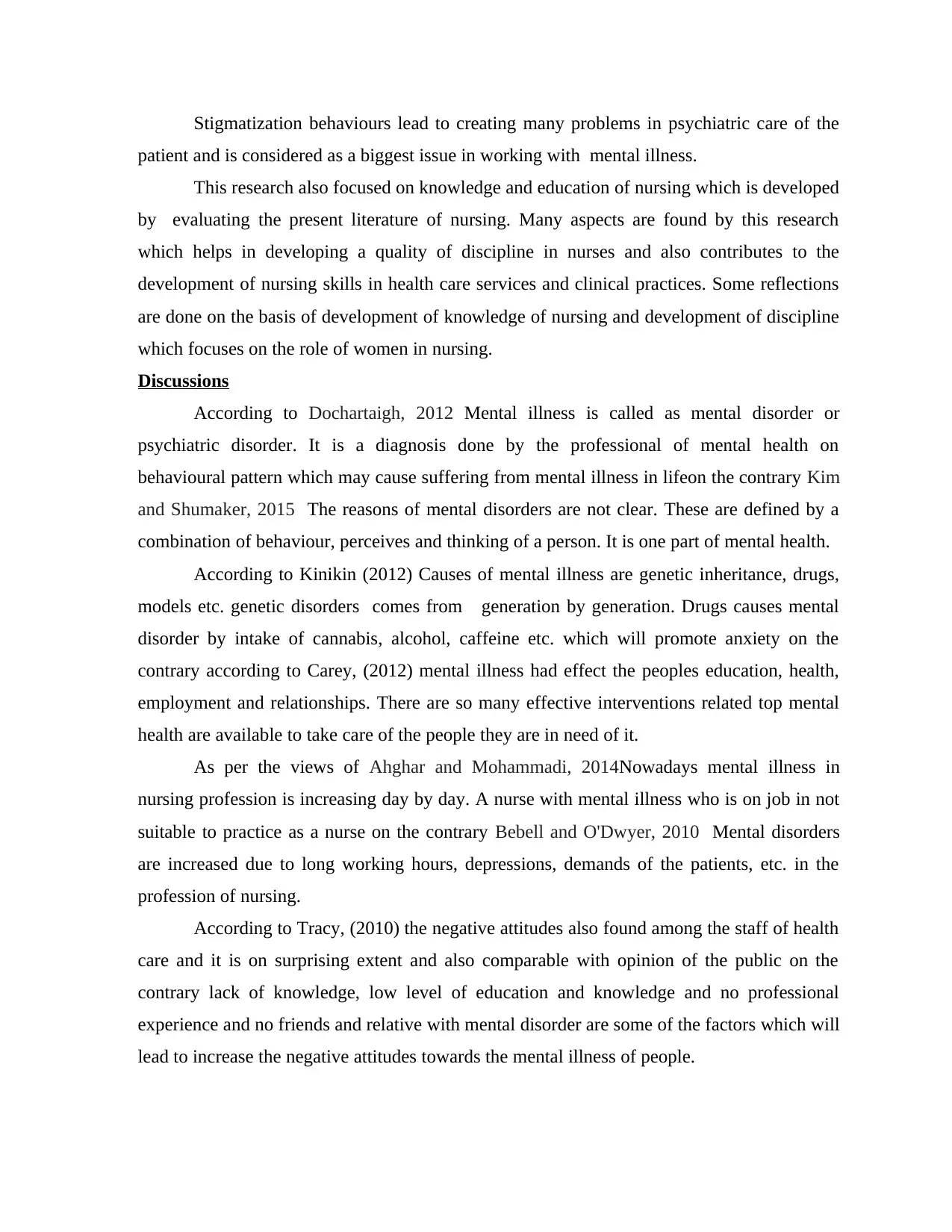
Stigmatization behaviours lead to creating many problems in psychiatric care of the
patient and is considered as a biggest issue in working with mental illness.
This research also focused on knowledge and education of nursing which is developed
by evaluating the present literature of nursing. Many aspects are found by this research
which helps in developing a quality of discipline in nurses and also contributes to the
development of nursing skills in health care services and clinical practices. Some reflections
are done on the basis of development of knowledge of nursing and development of discipline
which focuses on the role of women in nursing.
Discussions
According to Dochartaigh, 2012 Mental illness is called as mental disorder or
psychiatric disorder. It is a diagnosis done by the professional of mental health on
behavioural pattern which may cause suffering from mental illness in lifeon the contrary Kim
and Shumaker, 2015 The reasons of mental disorders are not clear. These are defined by a
combination of behaviour, perceives and thinking of a person. It is one part of mental health.
According to Kinikin (2012) Causes of mental illness are genetic inheritance, drugs,
models etc. genetic disorders comes from generation by generation. Drugs causes mental
disorder by intake of cannabis, alcohol, caffeine etc. which will promote anxiety on the
contrary according to Carey, (2012) mental illness had effect the peoples education, health,
employment and relationships. There are so many effective interventions related top mental
health are available to take care of the people they are in need of it.
As per the views of Ahghar and Mohammadi, 2014Nowadays mental illness in
nursing profession is increasing day by day. A nurse with mental illness who is on job in not
suitable to practice as a nurse on the contrary Bebell and O'Dwyer, 2010 Mental disorders
are increased due to long working hours, depressions, demands of the patients, etc. in the
profession of nursing.
According to Tracy, (2010) the negative attitudes also found among the staff of health
care and it is on surprising extent and also comparable with opinion of the public on the
contrary lack of knowledge, low level of education and knowledge and no professional
experience and no friends and relative with mental disorder are some of the factors which will
lead to increase the negative attitudes towards the mental illness of people.
patient and is considered as a biggest issue in working with mental illness.
This research also focused on knowledge and education of nursing which is developed
by evaluating the present literature of nursing. Many aspects are found by this research
which helps in developing a quality of discipline in nurses and also contributes to the
development of nursing skills in health care services and clinical practices. Some reflections
are done on the basis of development of knowledge of nursing and development of discipline
which focuses on the role of women in nursing.
Discussions
According to Dochartaigh, 2012 Mental illness is called as mental disorder or
psychiatric disorder. It is a diagnosis done by the professional of mental health on
behavioural pattern which may cause suffering from mental illness in lifeon the contrary Kim
and Shumaker, 2015 The reasons of mental disorders are not clear. These are defined by a
combination of behaviour, perceives and thinking of a person. It is one part of mental health.
According to Kinikin (2012) Causes of mental illness are genetic inheritance, drugs,
models etc. genetic disorders comes from generation by generation. Drugs causes mental
disorder by intake of cannabis, alcohol, caffeine etc. which will promote anxiety on the
contrary according to Carey, (2012) mental illness had effect the peoples education, health,
employment and relationships. There are so many effective interventions related top mental
health are available to take care of the people they are in need of it.
As per the views of Ahghar and Mohammadi, 2014Nowadays mental illness in
nursing profession is increasing day by day. A nurse with mental illness who is on job in not
suitable to practice as a nurse on the contrary Bebell and O'Dwyer, 2010 Mental disorders
are increased due to long working hours, depressions, demands of the patients, etc. in the
profession of nursing.
According to Tracy, (2010) the negative attitudes also found among the staff of health
care and it is on surprising extent and also comparable with opinion of the public on the
contrary lack of knowledge, low level of education and knowledge and no professional
experience and no friends and relative with mental disorder are some of the factors which will
lead to increase the negative attitudes towards the mental illness of people.
Secure Best Marks with AI Grader
Need help grading? Try our AI Grader for instant feedback on your assignments.
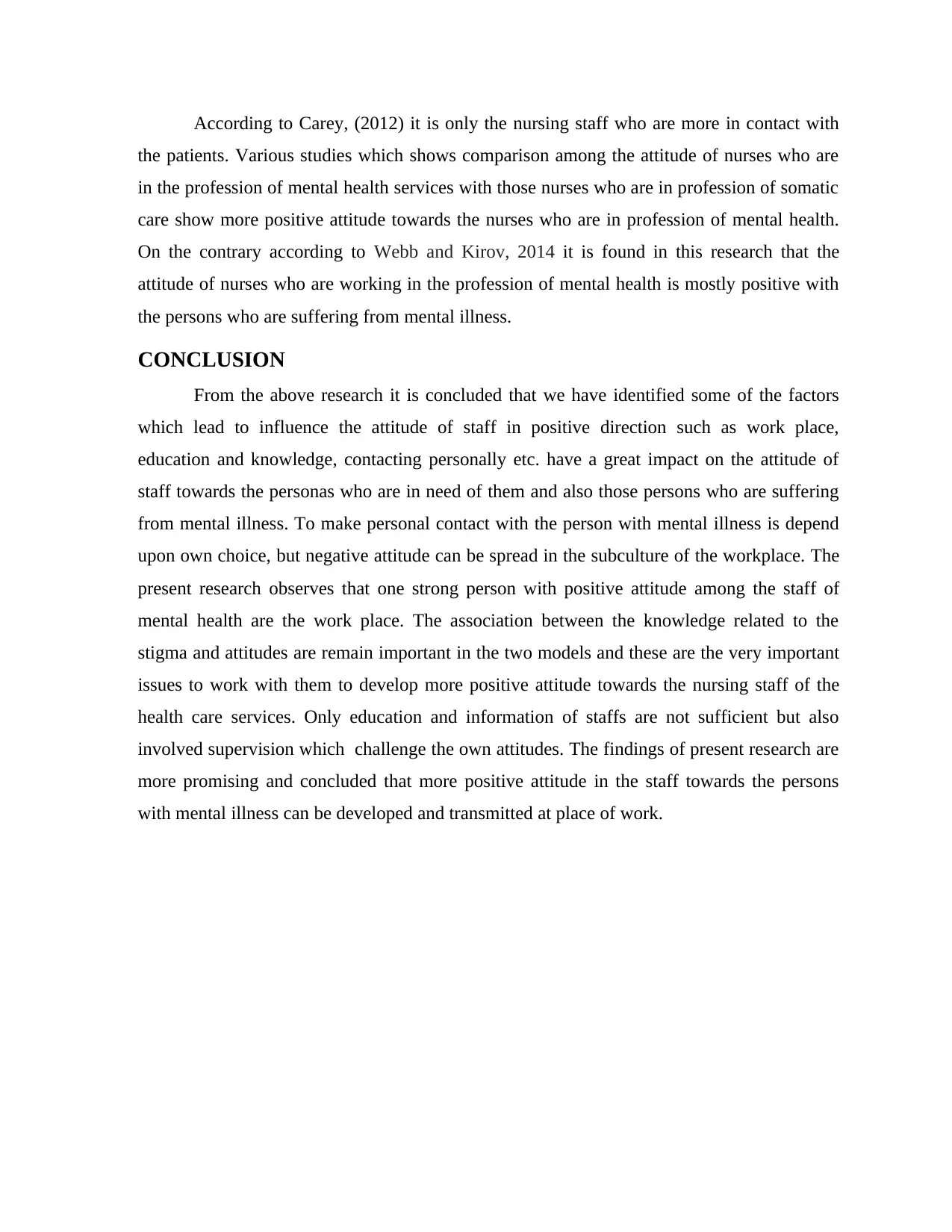
According to Carey, (2012) it is only the nursing staff who are more in contact with
the patients. Various studies which shows comparison among the attitude of nurses who are
in the profession of mental health services with those nurses who are in profession of somatic
care show more positive attitude towards the nurses who are in profession of mental health.
On the contrary according to Webb and Kirov, 2014 it is found in this research that the
attitude of nurses who are working in the profession of mental health is mostly positive with
the persons who are suffering from mental illness.
CONCLUSION
From the above research it is concluded that we have identified some of the factors
which lead to influence the attitude of staff in positive direction such as work place,
education and knowledge, contacting personally etc. have a great impact on the attitude of
staff towards the personas who are in need of them and also those persons who are suffering
from mental illness. To make personal contact with the person with mental illness is depend
upon own choice, but negative attitude can be spread in the subculture of the workplace. The
present research observes that one strong person with positive attitude among the staff of
mental health are the work place. The association between the knowledge related to the
stigma and attitudes are remain important in the two models and these are the very important
issues to work with them to develop more positive attitude towards the nursing staff of the
health care services. Only education and information of staffs are not sufficient but also
involved supervision which challenge the own attitudes. The findings of present research are
more promising and concluded that more positive attitude in the staff towards the persons
with mental illness can be developed and transmitted at place of work.
the patients. Various studies which shows comparison among the attitude of nurses who are
in the profession of mental health services with those nurses who are in profession of somatic
care show more positive attitude towards the nurses who are in profession of mental health.
On the contrary according to Webb and Kirov, 2014 it is found in this research that the
attitude of nurses who are working in the profession of mental health is mostly positive with
the persons who are suffering from mental illness.
CONCLUSION
From the above research it is concluded that we have identified some of the factors
which lead to influence the attitude of staff in positive direction such as work place,
education and knowledge, contacting personally etc. have a great impact on the attitude of
staff towards the personas who are in need of them and also those persons who are suffering
from mental illness. To make personal contact with the person with mental illness is depend
upon own choice, but negative attitude can be spread in the subculture of the workplace. The
present research observes that one strong person with positive attitude among the staff of
mental health are the work place. The association between the knowledge related to the
stigma and attitudes are remain important in the two models and these are the very important
issues to work with them to develop more positive attitude towards the nursing staff of the
health care services. Only education and information of staffs are not sufficient but also
involved supervision which challenge the own attitudes. The findings of present research are
more promising and concluded that more positive attitude in the staff towards the persons
with mental illness can be developed and transmitted at place of work.
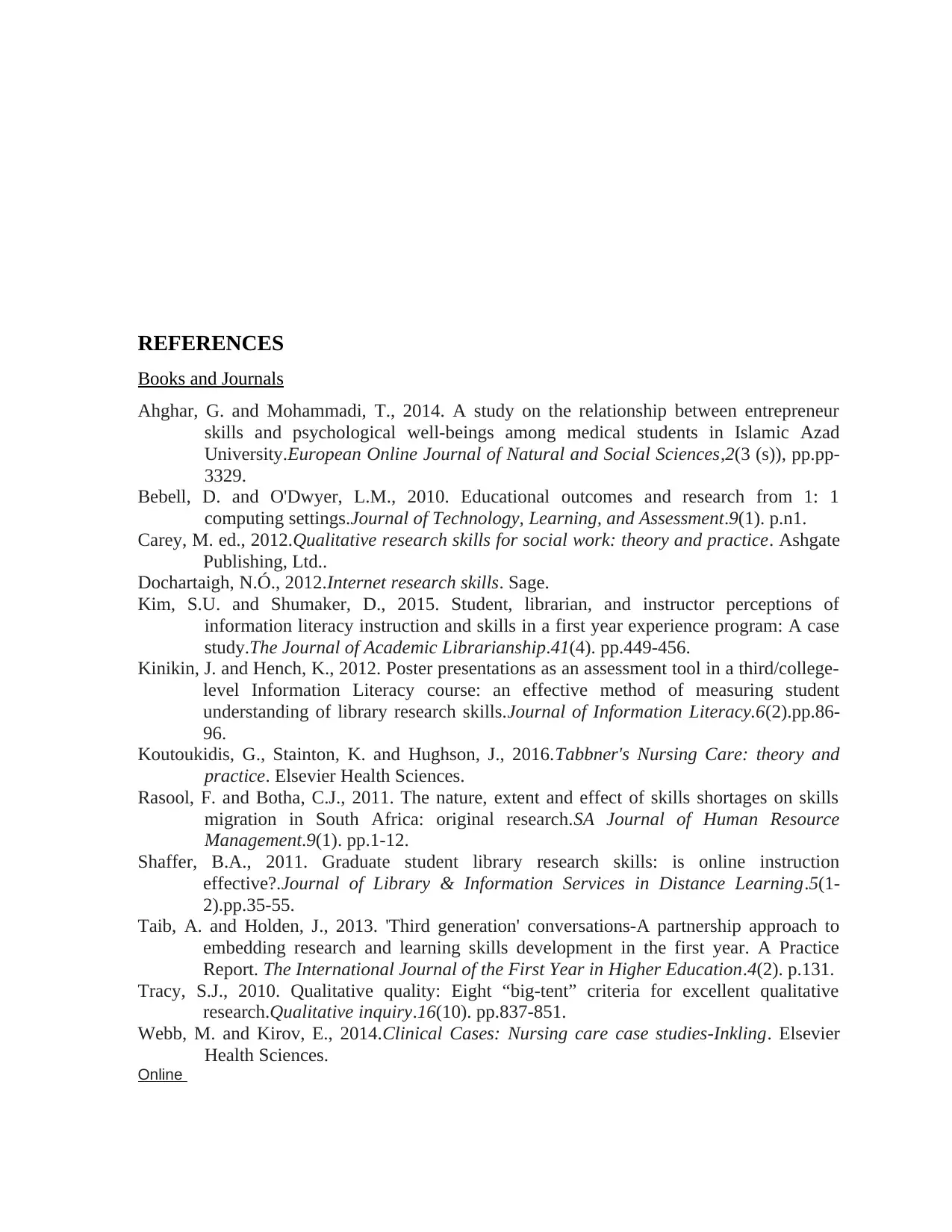
REFERENCES
Books and Journals
Ahghar, G. and Mohammadi, T., 2014. A study on the relationship between entrepreneur
skills and psychological well-beings among medical students in Islamic Azad
University.European Online Journal of Natural and Social Sciences,2(3 (s)), pp.pp-
3329.
Bebell, D. and O'Dwyer, L.M., 2010. Educational outcomes and research from 1: 1
computing settings.Journal of Technology, Learning, and Assessment.9(1). p.n1.
Carey, M. ed., 2012.Qualitative research skills for social work: theory and practice. Ashgate
Publishing, Ltd..
Dochartaigh, N.Ó., 2012.Internet research skills. Sage.
Kim, S.U. and Shumaker, D., 2015. Student, librarian, and instructor perceptions of
information literacy instruction and skills in a first year experience program: A case
study.The Journal of Academic Librarianship.41(4). pp.449-456.
Kinikin, J. and Hench, K., 2012. Poster presentations as an assessment tool in a third/college-
level Information Literacy course: an effective method of measuring student
understanding of library research skills.Journal of Information Literacy.6(2).pp.86-
96.
Koutoukidis, G., Stainton, K. and Hughson, J., 2016.Tabbner's Nursing Care: theory and
practice. Elsevier Health Sciences.
Rasool, F. and Botha, C.J., 2011. The nature, extent and effect of skills shortages on skills
migration in South Africa: original research.SA Journal of Human Resource
Management.9(1). pp.1-12.
Shaffer, B.A., 2011. Graduate student library research skills: is online instruction
effective?.Journal of Library & Information Services in Distance Learning.5(1-
2).pp.35-55.
Taib, A. and Holden, J., 2013. 'Third generation' conversations-A partnership approach to
embedding research and learning skills development in the first year. A Practice
Report. The International Journal of the First Year in Higher Education.4(2). p.131.
Tracy, S.J., 2010. Qualitative quality: Eight “big-tent” criteria for excellent qualitative
research.Qualitative inquiry.16(10). pp.837-851.
Webb, M. and Kirov, E., 2014.Clinical Cases: Nursing care case studies-Inkling. Elsevier
Health Sciences.
Online
Books and Journals
Ahghar, G. and Mohammadi, T., 2014. A study on the relationship between entrepreneur
skills and psychological well-beings among medical students in Islamic Azad
University.European Online Journal of Natural and Social Sciences,2(3 (s)), pp.pp-
3329.
Bebell, D. and O'Dwyer, L.M., 2010. Educational outcomes and research from 1: 1
computing settings.Journal of Technology, Learning, and Assessment.9(1). p.n1.
Carey, M. ed., 2012.Qualitative research skills for social work: theory and practice. Ashgate
Publishing, Ltd..
Dochartaigh, N.Ó., 2012.Internet research skills. Sage.
Kim, S.U. and Shumaker, D., 2015. Student, librarian, and instructor perceptions of
information literacy instruction and skills in a first year experience program: A case
study.The Journal of Academic Librarianship.41(4). pp.449-456.
Kinikin, J. and Hench, K., 2012. Poster presentations as an assessment tool in a third/college-
level Information Literacy course: an effective method of measuring student
understanding of library research skills.Journal of Information Literacy.6(2).pp.86-
96.
Koutoukidis, G., Stainton, K. and Hughson, J., 2016.Tabbner's Nursing Care: theory and
practice. Elsevier Health Sciences.
Rasool, F. and Botha, C.J., 2011. The nature, extent and effect of skills shortages on skills
migration in South Africa: original research.SA Journal of Human Resource
Management.9(1). pp.1-12.
Shaffer, B.A., 2011. Graduate student library research skills: is online instruction
effective?.Journal of Library & Information Services in Distance Learning.5(1-
2).pp.35-55.
Taib, A. and Holden, J., 2013. 'Third generation' conversations-A partnership approach to
embedding research and learning skills development in the first year. A Practice
Report. The International Journal of the First Year in Higher Education.4(2). p.131.
Tracy, S.J., 2010. Qualitative quality: Eight “big-tent” criteria for excellent qualitative
research.Qualitative inquiry.16(10). pp.837-851.
Webb, M. and Kirov, E., 2014.Clinical Cases: Nursing care case studies-Inkling. Elsevier
Health Sciences.
Online
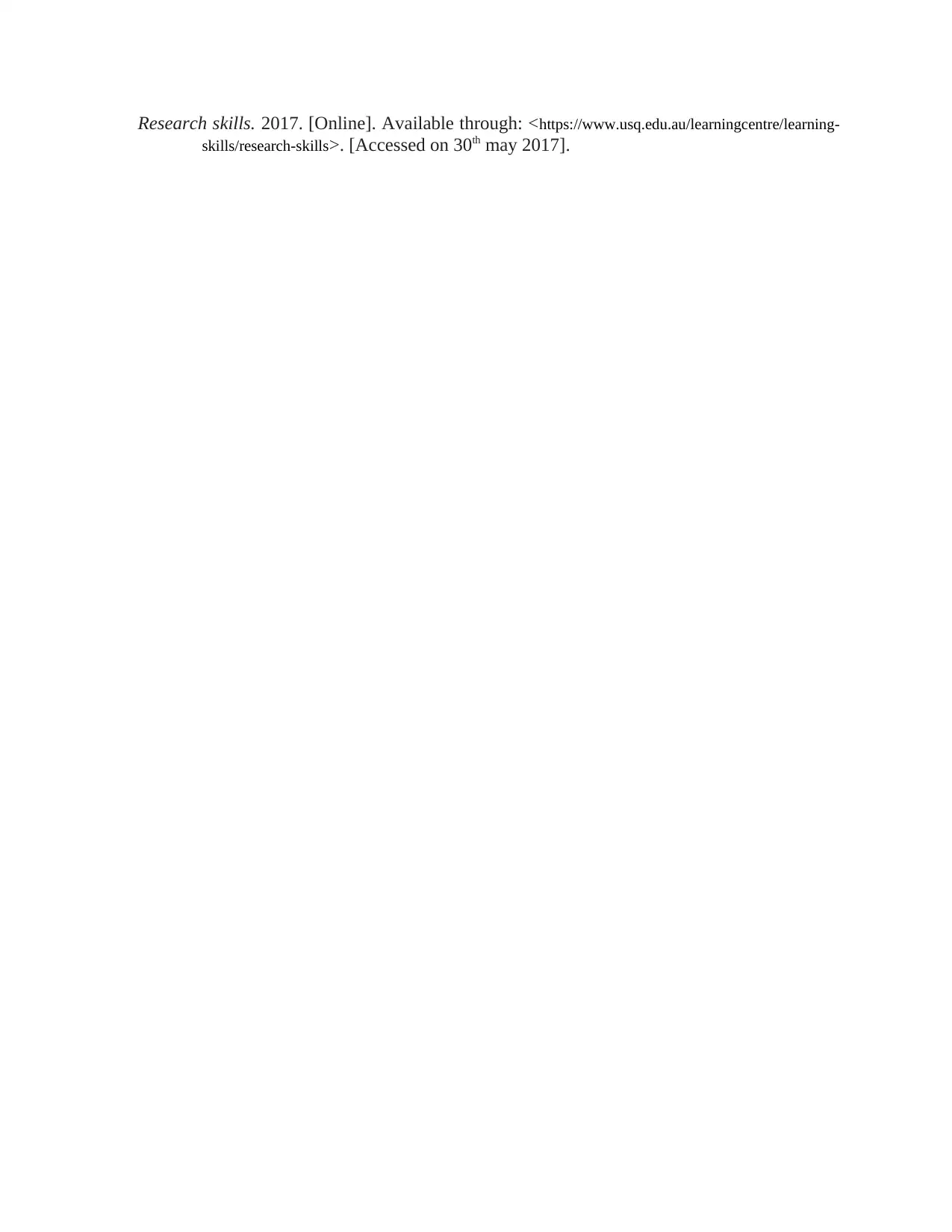
Research skills. 2017. [Online]. Available through: <https://www.usq.edu.au/learningcentre/learning-
skills/research-skills>. [Accessed on 30th may 2017].
skills/research-skills>. [Accessed on 30th may 2017].
1 out of 7
Related Documents
Your All-in-One AI-Powered Toolkit for Academic Success.
+13062052269
info@desklib.com
Available 24*7 on WhatsApp / Email
![[object Object]](/_next/static/media/star-bottom.7253800d.svg)
Unlock your academic potential
© 2024 | Zucol Services PVT LTD | All rights reserved.





